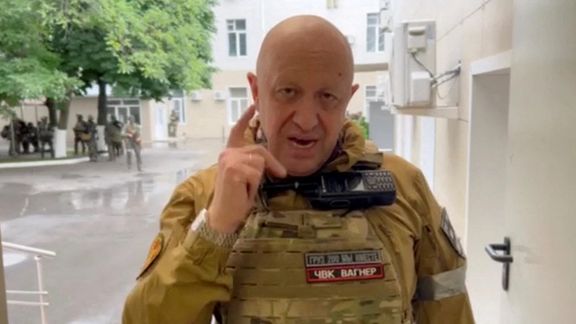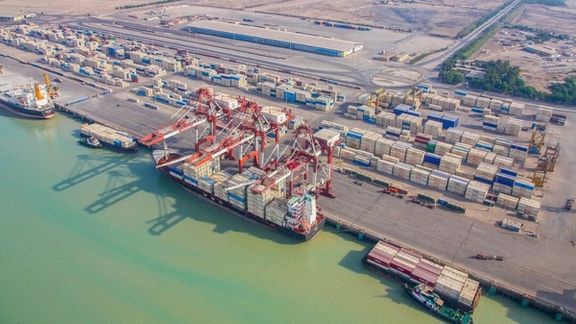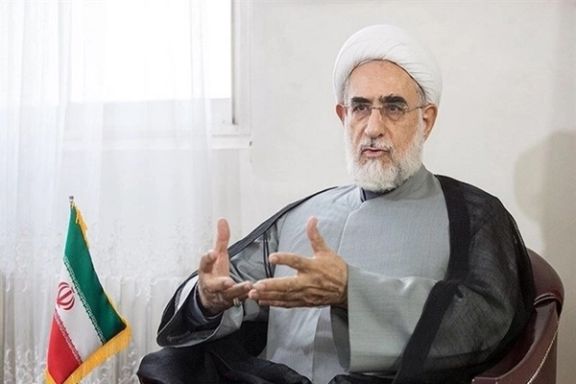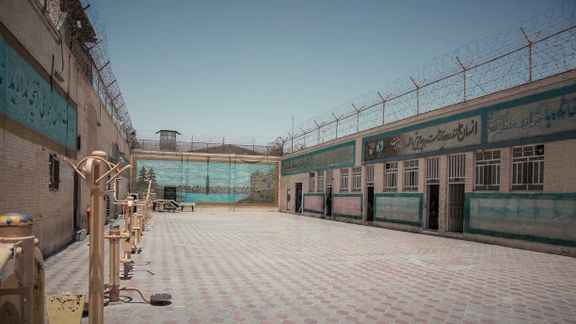Iran's Foreign Minister Calls Russian Counterpart Amid Turmoil

Iranian Foreign Minister Hossein Amir-Abdollahian, in a call with his Russian counterpart, said on Saturday he was confident Russia would get through current events in the country.

Iranian Foreign Minister Hossein Amir-Abdollahian, in a call with his Russian counterpart, said on Saturday he was confident Russia would get through current events in the country.
Amir-Abdollahian "voiced support for the rule of law in all countries, including Russia - a neighbor and a friend... and said he was confident that Russia would get through this stage," state media said in a brief report about the phone call with Sergei Lavrov.
Iran and Russia do not share any borders but are close military and diplomatic allies who have fought together in Syria since 2015 to save the regime of Bashar al-Assad in the country’s 12-year civil war.
Tehran’s military ties with Moscow have expanded since the invasion of Ukraine, with Iran supplying hundreds of kamikaze drones that Russia has used against civilian and military targets. Western powers have strongly objected to Iran’s move. The United States has said that stopping its weapons supplies is one of the conditions if Iran wants to see progress in nuclear negotiations and lifting of economic sanctions.
Earlier in the day, Iranian foreign ministry spokesman had also used the same wording in describing Tehran’s reaction to a military rebellion by the head of the mercenary Wagner group, Yevgeny Prigozhin.
While Tehran might be concerned about Putin’s hold on power, Iranians opposed to the regime have expressed satisfaction that Russian leader is facing domestic turmoil.

Iran supports the rule of law in Russia, the foreign ministry announced Saturday in the first official reaction coming from an ally of Russia’s Vladimir Putin.
The ministry’s spokesman Nasser Kanaani said in a very brief statement published on the ministry’s website that the recent events in Russia were an internal issue of the country.
The statement was issued several hours after Wagner mercenary group leader Yevgeny Prigozhin announced he had directed his troops towards Moscow.
There are unconfirmed reports of a phone talk between presidents Ebrahim Raisi and Vladimir Putin Saturday afternoon.
However, many Iranians opposed to the Islamic Republic regime were celebrating Putin’s apparent misfortune, saying that his demise will hasten the fall of Supreme Leader Ali Khamenei. Alireza Nader an Iran watcher and activist tweeted: “Dictators fall, regimes are overthrown, freedom is achieved. Don’t believe the naysayers. Keep doing what you think is right.”
Iranian government media -- including the Revolutionary Guards (IRGC) linked Tasnim and Fars news agencies and Press TV, the English Channel of the Islamic Republic State TV -- only reflected the Putin government’s narrative all day on Saturday.
They published selected news about Prigozhin’s challenge, such as Putin calling Prigozhin’s move “mutiny” and a “stab in the back”, and saying he would not succeed in his endeavor to take control of Moscow.
Nour News, affiliated to the Supreme National Security Council (SNSC), said in a tweet on Saturday that Wagner group's action could lead to "destructive psychological consequences" given Russia’s involvement in the Ukraine war. “But this group essentially lacks the minimum power necessary to challenge the Russian army,” it added.
In another tweet a few hours later, Nour News said Putin’s remarks about “the issue of internal treason as well as his determination to prevent civil war” could indicate that he knows “the West has a new plan to weaken Russia’s national cohesion and bring Moscow to its knees in the Ukraine war.”

A Telegram channel identifying itself as the Revolutionary Guards channel re-published a Twitter post by Reza Abbasi, a hardliner journalist, who suggested Iran would help Russia defeat opposition to Putin. The channel is believed to be affiliated to the IRGC.
‘’We once prevented the downfall of the Syrian government for our own national interests! If necessary, we will also prevent the downfall of Putin’s government,” Abbasi had said in his tweet.
Tasnim later on Saturday afternoon published an interview with Mehdi Seyf-Tabrizi, a Russia expert, who said Prigozhin was helped by “hands from outside Russia” and that in the current circumstances his actions may “deal a fatal blow to Russia from the inside” and distract Moscow from the Ukraine war.
Seyf-Tabrizi said the Russian people will strongly defend the government against the Wagner forces if the course of events continues in the same way in the next few days. “But I don’t think these operations last more than a few days.”
Relatively more independent media outlets have cautiously been providing some real coverage to the events unfolding in Russia.
The conservative news website Nameh News, however, published an interview with Nematollah Izadi, the last Iranian ambassador to the Soviet Union, who said the Russian people are not happy about Putin’s policies and his war on Ukraine which have brought on sanctions.
He also said the Islamic Republic’s involvement in the Russian war on Ukraine was “pointless” and “based on wrong calculations” and has put the country in a difficult place and had disagreeable consequences.

The Financial Action Task Force (FATF) kept Iran on its blacklist along with North Korea this week after Tehran took no action to comply with global regulations.
The move by the Financial Action Task Force will further isolate the Islamic Republic from international financial markets and banking system.
“In June 2016, Iran committed to address its strategic deficiencies. Iran’s action plan expired in January 2018. In February 2020, the FATF noted Iran had not completed the action plan,” said the watchdog in a statement.
In October 2019, the FATF called upon its members and urged all jurisdictions to require increased supervisory examination for financial institutions based in Iran; introduce enhanced reporting of financial transactions.
“Now, given Iran’s failure to enact the Palermo and Terrorist Financing Conventions in line with the FATF Standards, the FATF fully lifts the suspension of counter-measures and calls on its members and urges all jurisdictions to apply effective counter-measures,” the group’s 39 members said in a statement after a week-long plenary session.
Iran’s previous government submitted legislation to parliament in 2017 to adopt laws to implement FATF’s standards, but the hardliners have since prevented the final approval of the laws.
Opponents argue that if Iran accedes to FATF demands it will not be able to provide financial help to allied groups in the region that are part of Tehran’s “axis of resistance”.
These groups, such as the Lebanese Hezbollah and some Palestinian militant organizations, are designated as terrorists by some countries and act as proxy forces to help the Islamic Republic spread its influence in other countries.

An Iranian transport official says ports all over the world must obtain permission from the US Office of Foreign Assets Control to host Iranian ships.
Masoud Daneshmand, member of the board of directors of the Center of Transport Institutions said Saturday that most of Iran's shipping vessels are sanctioned and as a result they are inactive.
“The Shipping Company of the Islamic Republic of Iran is under sanctions, and all ports must obtain permission from the US Treasury to accept Iranian ships. If a port does not receive permission from the OFAC, they will be subject to secondary sanctions,” noted Daneshmand.
He further added that some countries like India and South Africa have obtained licenses to accept the Iranian ships, but it should be noted that they cannot berth in all the ports.
In March, the United States imposed new sanctions on Iran-linked shipping and petrochemical companies, including two shipping firms based in China.
The sanctions also targeted 20 shipping vessels linked to firms in China, Vietnam and the United Arab Emirates, the Treasury Department's website showed.
The sanctions were issued under a 2018 US executive order that restored sanctions targeting Iran's oil, banking and transportation sectors.
In 2019, OFAC issued an advisory to alert persons around the world that are involved in shipping petroleum or petroleum products from Iran.
“These shipments create significant sanctions risk for entities and individuals in the shipping industry, including shipping companies, vessel owners, managers, operators, insurers, and financial institutions,” read the advisory.

Amid more news of government corruption and mismanagement, the secretary general of Iran’s Jomhouriat Party has called on President Ebrahim Raisi to step down.
In a speech at the latest congress of the party this week, reformist cleric Rassoul Montajabnia said that "corruption has never been so widespread in any of the previous governments in Iran."
He said Iranians are suffering as they are being tortured by the economic hardships the government of President Raisi has imposed on them.
Montajabnia who was speaking on Friday, further charged that Raisi administration officials cannot achieve anything in the negotiations with the West more than what the Rouhani administration had achieved. Nonetheless, he saw the talks as a positive development.
After restoring diplomatic ties with Saudi Arabia with China’s mediation, Iran is reportedly holding talks with the United States in Oman. "Negotiating is better than insisting on one side of the argument at any price," he said.
However, he added: "It is not good that members of the current government have adopted the diplomatic overtures of their predecessors but still call them traitors!"
He was referring to continuing attacks by hardliners against the Rouhani government for being too weak in their dealings with the West.

Meanwhile, Montajabnia criticized the government for the way it handled the restoration of ties with Saudi Arabia and said that the fact that a communist state had to mediate between Iran and another Muslim country was not consistent with Iran's dignity."
Montajabnia then lashed out at the government for ''serious and widespread administrative corruption in a government that came to power with the motto of fighting corruption." Referring to a recent case of financial corruption among state officials, Montajabnia said corruption has never been as widespread in Iran under any previous government."
He also criticized the Raisi administration officials for failing to stand by the promises they had made to the people, and leaving the nation helpless with a lot of financial problems. Referring to a recent case of bribery involving tens of lawmakers and at least one government ministry. He further charged that gangs and mafias have infiltrated various parts of the government and the parliament.
The former Governor of the Central Bank of Iran, Abdolnaser Hemmati, recently noted in an Instagram post that he had warned Raisi during the election campaigns in 2021 that the promises he was giving could not be met as there were no funds available." Hemmati also accused all other candidates of "promising the redistribution of poverty in Iran rather than creating wealth for the people."
Meanwhile, according to a Khabar Online report, Hemmati further charged that Raisi in his latest interview on state TV has concealed the fact that the inflation rate in Iran in May was over 60 percent. He added that Raisi declined to tell the nation about what happened to the promises he had made in 2021 to improve the country's economic situation. He further charged that the state television helped Raisi to conceal painful facts.
In another development, reformist commentator Abbas Abdi said those like Raisi and his economic aides who promised to bring down the inflation rate to a single-digit figure, even without resolving the nuclear issue, should now be held accountable for the country's current situation.
Abdi charged that following the restoration of ties with Saudi Arabia and reported contacts with the West, the Raisi administration appears to have realized the importance of nuclear negotiations for Iran's economy and foreign policy although it still finds it difficult to acknowledge that.

A human rights organization reported the beating of political prisoners in the central Iranian city of Yazd in an apparent fight staged to punish them..
Karun Human Rights Organization said the attack happened in Yazd Central Prison June 19, during which a number of prisoners were injured.
“The prison's medical facilities were insufficient to treat the injured, and some of the prisoners were transferred to Yazd City Hospital,” added the report.
Among the injured, Mohammad Haydari, 35, from Ahvaz, is known to be a political prisoner but there is no information about his health so far.
The Arab political activist, who was sentenced to 15 years in prison on the charge of moharebeh (War against God), was stabbed in the chest.
One of the prisoners who witnessed the conflict told Karun that more than 20 Afghan prisoners were also injured.
According to this report, another Arab political prisoner named Jafar Beit Abdollah, 33, who was sentenced to 16 years in prison on the charge of moharebeh was also injured on his arm.
Karun added that most of the Afghan prisoners and some political prisoners have been transferred to solitary confinement.
Yazd Central Prison is home to about three thousand prisoners, among them over one thousand foreign nationals held in the worst conditions.
Eleven political prisoners in Yazd live in inappropriate conditions and have to endure discrimination and insults from officials and targeted conflicts inside the prison staged to harass them.